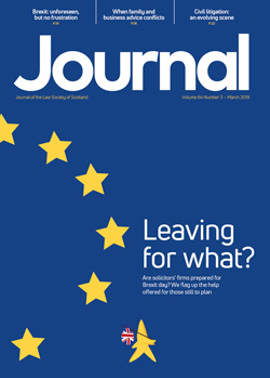Opinion: Laurie Anderson
At the end of 2018 the Law Society of Scotland published the results of its Profile of the Profession survey. Participants covered solicitors and paralegals at all stages of their career, and from firms large and small. One key figure that stood out was that one third of LGBTQ+ identifying individuals did not feel entirely comfortable being “out” at work (and 22% preferred not to say). Sadly, this is not a shock to many LGBTQ+ lawyers throughout the UK.
It appears that, in the vast majority of cases, what may look like the many is in reality the hard graft of the few. These committees are often created by and consist solely of individuals from minority groups. To that end, management will comment that they feel bombarded by statistics, left only to be buried in every group’s call for change.
“I don’t care if someone’s gay; that doesn’t affect their ability to do their job.” This comment might be a genuine response, but this statement is only accurate until it inevitably does affect their ability to do their job, and even their health.
Groundbreaking LGBTQ+ charity Stonewall UK has identified that, statistically, the instances of members of this community developing severe mental health issues directly because of having to suppress their identity at work are alarmingly high. There are many instances of individuals experiencing anxiety, panic attacks and stress. It is hard to maintain that anyone suffering from any of these issues can bring their best self to work or truly showcase their abilities. An inclusive workplace is essential to ensure that all staff can be at their best at work.
A familiar scenario for LGBTQ+ individuals in the workplace involves patrolling themselves in what they say and the pronouns they use. Imagine how many times on a typical Monday you are asked by colleagues about your weekend and what you got up to. Now, imagine retelling that entire story without using a “he” or “she” to describe your boyfriend, girlfriend, partner, husband or wife. It demands a great deal of concentration and leads to exhaustion, but sadly it’s still a frequent occurrence in the lives of LGBTQ+ individuals in the workplace.
Inevitably the longer you keep this up, the harder it is to reverse. For many, it can be a terrifying thought to have a conversation with just one colleague at work about their sexual orientation, never mind to stand in front of a firm and “out” yourself. That can’t be the solution.
Within the legal sector there’s a fundamental level of equality still not being met for LGBTQ+ individuals. The onus needs to shift from the individual, to the central culture of the firm. There is a clear need to change the “I don’t care” attitude mentioned above, even if it is meant with the best of intentions, to a culture of educating on precisely why everyone should care. We need to go beyond the attitude of coming out being met with acceptance.
What needs to be created is a complete culture of inclusion. Law firms that get it will endeavour to put as much effort into supporting their LGBTQ+ employees as they put into impressing their clients. Starting points such as implementing unconscious bias training, introducing rainbow lanyards to all staff, and appointing mental health first aiders will all act to drive the right culture and give focused support to LGBTQ+ colleagues and others who need it.
This culture shift will not only lead to an avoidance of the development of unnecessary mental health issues, but also lead to all employees feeling intrinsically included and comfortable to be themselves. There is research that shows the creation of an inclusive and open workspace for LGBTQ+ individuals leads to considerably greater productivity and job satisfaction. In creating that environment, if an individual wants to come out, or simply be open, there is no fear.
However, steps such as issuing rainbow lanyards to staff have to be the starting point, rather than the end game. We have to learn to go “over the rainbow” for everyone, no matter the pronouns.
In this issue
- How will Brexit affect my mother-in-law?
- Settling the debate on sequestration
- Taking wellbeing seriously
- How will personal data continue to flow after Brexit?
- Buildmark, and a little extra help for NHBC
- Reading for pleasure
- Opinion: Laurie Anderson
- Book reviews
- Profile: Lord Mackay of Clashfern
- President's column
- People on the move
- Is your legal software ready to remain compliant in 2019?
- What's the deal?
- Ready to leave?
- A tapering opportunity
- Brexit: no dealbreaker either
- The business of divorce
- Trailblazing 12
- Cohabitants: rebalancing the law
- Litigation: an evolving scene
- Chain transactions
- When delay is not fatal
- Data protection – deal or no-deal?
- Two cases and an order
- Reshaping trade mark law
- When the wheels come off
- Parentage or privacy?
- Access right, right of access or right of way?
- Team of one
- Public policy highlights
- OPG update
- Housing specialism added to accreditation list
- At the boundary's edge
- Keep the dual role
- Executry and trust accounting: new guidance
- Moving nightmares
- Accredited paralegal update
- Sign up for conference
- Accredited Paralegal Committee profile
- Ask Ash






